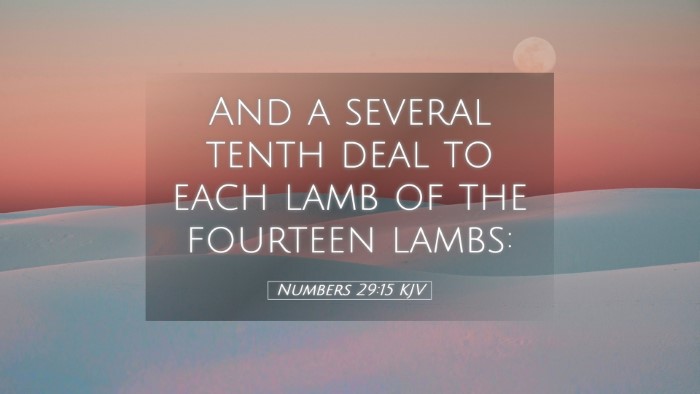Commentary on Numbers 29:15
Bible Verse: Numbers 29:15 - "And one kid of the goats for a sin offering, to make an atonement for you."
Introduction
The verse is situated within the context of the description of offerings during the Feast of Tabernacles. The detailed instructions provided here underscore the significance of sacrificial rituals in Israelite worship and the concept of atonement.
Significance of the Kid of the Goats
This verse highlights the specific requirement of offering a young goat as a sin offering. Such offerings were central to the Israelite system of worship. They served multiple purposes:
- Atonement: The primary purpose of the kid of the goats was to make atonement for the people. This emphasizes God's provision for reconciliation with His people.
- Representation: The offering represents the substitutionary principle, where the goat bears the iniquity of the people.
- Collective Responsibility: The term "you" in the verse indicates the collective nature of sin and the need for corporate atonement.
Theological Insights
This verse provides profound insights into theological themes such as sin, atonement, and divine grace:
- Sin Offering: According to Matthew Henry, the sin offering serves as a reminder of human fallibility and the necessity for sacrifice in approaching a holy God.
- Atonement Process: Adam Clarke remarks on the intricate details of these sacrificial rites, indicating their importance in maintaining covenantal harmony between God and His people.
- Foreshadowing Christ: Albert Barnes draws parallels between this offering and the ultimate sacrifice of Christ, asserting that the offerings are typological pointers to the greater atonement achieved through Christ's death.
Historical Context
Understanding the context in which these regulations were given enhances our comprehension of their purpose:
- Israel’s Wilderness Experience: The Israelites were in the wilderness, a time marked by both divine provision and rebellion. The sacrificial system was established to address ongoing sin and to promote worshipful living.
- Liturgical Significance: The worship practices outlined in these chapters reinforced the community’s reliance on God's grace and mercy, particularly during significant festivals such as the Feast of Tabernacles.
- Covenantal Relationship: The establishment of specific offerings speaks to God's desire for a relationship with His people, showcasing the necessity of atonement to sustain that relationship.
Practical Implications
Pastors and theologians can draw practical applications from this verse:
- Understanding of Atonement: The need for atonement should be emphasized as an ongoing theme in teaching and preaching, recognizing the necessity of Christ's sacrifice in light of Old Testament practices.
- Encouragement to Repentance: This verse serves as a reminder for congregations about the seriousness of sin and the need for repentance as a pathway to restoration.
- Community Worship: The communal aspect of the offerings can inspire congregations to engage in collective worship experiences that acknowledge shared failures and celebrate God's forgiveness.
Conclusion
Numbers 29:15 is rich in meaning and implication, both historically and theologically. It is a lens through which modern readers can appreciate the complexity of Old Testament worship while also recognizing its fulfillment in Christ. Understanding these connections aids in enriching the faith community’s grasp of God's redemptive plan throughout history.


